|

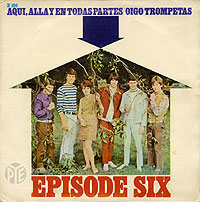

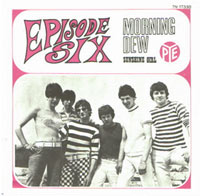

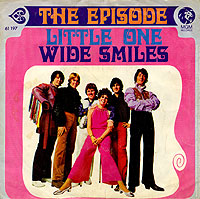
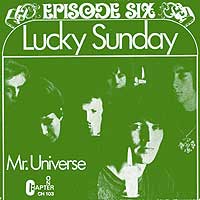

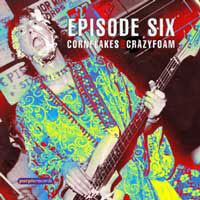
|

DISC
ONE :
Sanctuary's
new Episode Six double CD 'Love, Hate, Revenge' is an upgraded
and expanded reissue of Sequel's excellent 1991 'The Complete
Episode Six' collection. Disc one comprises the band's singles,
while disc two bulks up the original bonus tracks from six to
twenty-two.
For
those unfamiliar with Episode Six, they were Ian Gillan and Roger
Glover's pre-Deep Purple band, with whom they released nine singles
between 1966 and 1969, all of which somehow fell short of chart
success. It all ended when Ritchie Blackmore, Ian Paice and Jon
Lord caught one of their London shows at the behest of drummer
Mick Underwood, and poached both men for Deep Purple. Episode
Six attempted to continue, but after Mick Underwood split away
with new members John Gustafson and Pete Robinson to form Quatermass,
the band sank into obscurity until their increasingly rare catalogue
began to be snapped up by curious Deep Purple fans and collectors
of Sixties pop music. What they found often hinted at Messrs Gillan
& Glover's future successes, and baffled that the band had
never broken into the big time.
•
However, it is easy to see why Episode Six's first single "Put
Yourself In My Place" (from January 1966) failed to set the
charts alight. It's a rather average Hollies song, played in lacklustre
fashion by session musicians, with Episode Six only allowed to
contribute the vocals. The B-side "That's All I Want"
is much better, rattling along very nicely, and as a bit of history
it's also Roger Glover's first recorded composition.
•
"I Hear Trumpets Blow" followed in April 1966, and is
a piece of pure adulterated pop. GIllan's lead vocal is nice,
but the whole thing is a bit too jaunty for it's own good. The
B-side "True Love Is Funny That Way", written by the
group's drummer Harvey Shield, is superior.
• 'Here
There & Everywhere" from August 1966 is a beautiful reproduction
of the Paul McCartney classic, with Ian Gillan putting in a wonderful
performance. Glover's B-side "Mighty Morris Ten" is
a lighthearted send-up of The Beach Boys 'Shut Down' style car
songs. Fun, but definitely a B-side.
•
'Love, Hate, Revenge' was released in January 1967. One year on
from their first single Episode Six proved their versatility with
this classy piece of psychedelic pop. The UK version had a chanted
middle section, bizarrely replaced in the USA by an electronic
drone. The US version is included on disc 2. Another string to
Episode Six's bow was an ability to perform strong r&b, shown
here by the enjoyable B-side 'Baby, Baby, Baby'.
•
'Morning Dew' (June 1967) is a great version of the Tim Rose classic,
with Gillan belting in superbly on the chorus. B-side 'Sunshine
Girl', written and sung by Roger Glover, is frankly a bit crap
but still fun!
•
'I Can See Through You' (October 1967) is one of Episode Six's
finest moments, and one of the best songs of the sixties. Roger
Glover's first A-side, it's a progressive mini-masterpiece exploding
with ideas, including elements of Sgt.Pepper and The Who's 'I
Can See For Miles' . Many other bands would have folded under
the disappointment of it failing to become a hit, but Episode
Six continued.
The
band's management always seemed to prioritise their jack-of-all-trades
cover band reputation to keep their busy gigging and BBC radio
schedule ticking along. Any hope of a real push in any one direction
rested on a single taking off in the charts. Their singles output
emphasize the point. For me, it says it all that the B-side 'I
Can See Through You' was a schmaltzy cover of Nat King Cole's
'When I Fall In Love'.
•
'Little One' (February 1968) involved a halfhearted attempt at
gaining the band some 'cool', with their name changed to the more
underground sounding 'The Episode'. However the A-side is a straight
pop cover, aimed at no market in particular and consequently falling
between a number of stools. B-side 'Wide Smiles' is Gillan and
Glover's first joint composition to be recorded. It's jaunty 'doo-be-boop-de'
style complete with flutes belies GIllan's attack on people in
the music industry. His disillusionment is understandable, but
the band still had two more shots left at the charts.
• Gillan
& Glover's 'Mr.Universe' (October 1968) was the belated follow-up
to 'I Can See Through You', with great vocals (including Gillan's
first recorded scream), and marvelous lyrics, guitar, arrangement,
everything... However, it was only a B-side for the big
production pop treacle of 'Lucky Sunday'.
•
And so to the last Episode Six single. Reacting to feedback from
a BBC radio performance of guitarist Tony Leander's tremendous
'Mozart Vs The Rest' instrumental, the track was rushed out as
a single in February 1969; though not fast enough. Despite steady
sales the charts remained unmolested. A shame, as it's a great
little single, complete with the ultra-tight instrumental 'Jak
D'Or' on the flip-side.
And that was that; a few months later, Gillan and Glover accepted
an offer to join Deep Purple.
•
One of the halfhearted tactics tried towards the beginning of
Episode Six's recording career was to launch singles as solo efforts.
Only two were completed. Sheila Carter's 'I Will Warm Your Heart'
is a beautifully sung slowie, although ironically it sounds a
bit hurried, while the B-side 'Incense' is a ghastly sub-gospel
item with Ian GIllan on organ. Graham Carter's 'I Won't Hurt You',
issued as Neo Maya, is a lost classic, weird but compulsive. Its
B-side 'UFO' is just a list of UFO sightings read out over a drum
pattern!
DISC
TWO :
Disc two is given over to 'rarities, demos and live recordings'.
The sound quality is variable, the nine live tracks (grouped together
at the end of the CD) could be a bit lo-fi for some ears. Of the
22, six studio demos were originally on the 1991 Sequel collection,
3 others are repeated from Purple Records' 'Cornflakes & Crazyfoam'
double CD (1965 demos of 'Love Is A Swinging Thing' , 'Steal Your
Heart Away', and the US version of 'Love, Hate, Revenge'), and
the rest are previously unreleased.
• There
are five demo tracks from Episode Six's first studio session in
1964, all of which show the band already a highly professional
and practiced sounding outfit. 'My Babe' (first released on the
Sequel CD) is interesting in that it features Andy Ross, Ian Gillan's
predecessor in the group, busy doing an Elvis voice for all he's
worth. However he's plainly not the lead singer, but just part
of the ensemble. The other '64 demos are previously unreleased,
including a harmony version of 'Cottonfields' which precedes the
Beach Boys version by four years, and a rocky take of 'Zip-a-Dee-Doo-Dah'
which really works (no, honestly!).
• The
five out-takes from 1966-67 originally appeared on the Sequel
CD, but deserve a mention for being every bit as good as the band's
singles from the time. 'The Way You Look Tonight' is a strong
harmony-based rendition similar in style to 'When I Fall In Love',
'Time And Motion Man' from 1967 is a strange listen, all off-centre
harmonies and melody, the sort of thing that you'd either love
or be irritated by. It's intrinsically not catchy, but Episode
Six manage to make it just that. Of Roger Glover's two compositions
'Plastic Love' is disappointing plastic psychedelia, while 'Only
Lonely People' is a very powerful, instant classic. Period. It
simply has to be heard.
• The
live tracks, mostly from 1968, are all previously unreleased,
and include the Gillan/Glover compositions 'I Am The Boss' and
'Monster In Paradise', and strong covers of 'Slow Down', 'Morning
Dew', 'Orange Air', 'Hazy Shade Of Winter' (sounding like a proto
'Into the Fire' on this occasion), 'Him Or Me' and 'The Castle'.
The
only real absentee is the film soundtrack song 'Gentleman Of The
Park', which is on 'Cornflakes & Crazyfoam'. So, for anyone
wanting the essential Episode Six in one purchase, 'Love, Hate,
Revenge' is the one to go for. If
you wish to explore further out-takes and live tracks by the band,
I'd recommend 'Cornflakes & Crazyfoam'. Between them they
are the last word on a great band.
review:
Mark Ainsworth
|